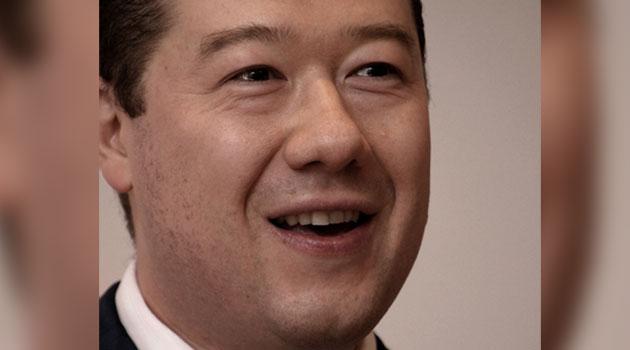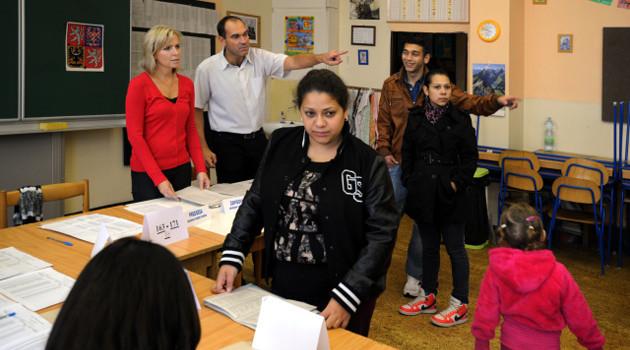Commentary: Monothematic parties lose, but carefully-expressed bigotry wins votes in the Czech Republic

Of the anti-Romani or extremist-oriented parties that ran during the regional and Senate elections this weekend, the Freedom and Direct Democracy group (Svoboda a přímá demokracie – SPD), founded by Tomio Okamura, scored the biggest success, mostly by running in coalition with the Citizens’ Rights Party (SPO), which is connected to Czech President Zeman. Bigoted candidates such as Jaroslav Doubrava and Liana Janáčková made it to the second round of the Senate elections, and Jiří Čunek, running for the Christian Democrats (KDU-ČSL) scored a significant success in the Zlín Region.
Only Okamura’s party scored, extremists failed
The overall outcome of the elections demonstrates that monothematically anti-immigration and anti-Islamic groups did not succeed. Radical anti-Romani rhetoric, such as that deployed in the town of Most by Jiří Maria Sieber, did not succeed either.
Evidently monothematic, transparent racism does not work on Czech voters. Sieber came in dead last in Most, with 1 241 votes.
The only successful hate group – which, however, does its best not to be monothematic in its appearances – is Tomio Okamura’s SPD. That movement apparently sucked up most of the anti-immigrant, anti-Islam, anti-Romani, radical votes.
However, since the vast majority of political parties, with the exception of the Greens/Pirates, more or less expressed themselves as against refugee reception, the topic of migration didn’t really have any essential influence on the election outcomes. In almost every party one can find a “decent Czech” (or a Slovak) who alleges that he or she would be glad to set refugees on fire or send Romani people to labor camps.
Commentator Petr Honzejk at news server iHNed.cz has summed the situation up well. “This can be interpreted in various ways. Optimistically, we could say it means the Czech Republic doesn’t have any talent for extremism. Pessimistically, we could say it’s basically because everybody here is an extremist,” he writes.
“This was mainly about whether the six parties on the spectrum that profiled themselves exclusively on the immigration issue could take votes away from the others. In these results we see that the coalition of the SPD and the SPO won 5-6 % in many regions, while all of those other parties together got just around 2 %,” Daniel Petr, an analyst and sociologist, commented on the extremists’ results for public broadcaster Czech Television.
At national level, Okamura’s coalition with the SPO won 4.67 % of the vote, which means 32 seats on regional assemblies country-wide. The SPD alone also added two seats in Zlín Region, which together means 34 seats for Okamura’s party.
“We must realize that because our movement has existed for just 14 months, these results are de facto an historical record for the Czech Republic in general. This is a testament to the fact that citizens have sent the clear message that our movement, with its program of direct democracy and its patriotic heart, has a clear place on the Czech political scene,” Okamura commented on the results.
Doubrava and Janáčková make it to the second round
The anti-Romani candidate Liana Janáčková ran for the Senate after a six-year break. She was a Senator from Ostrava from 2004-2010.
In 2010 she lost to the Czech Social Democratic Party (ČSSD) candidate Antonín Maštalíř. During that election she won almost 9 000 votes in the first round but lost by about 1 400 in the second.
Now, with 5 777 votes (19.53 %), she is in first place for the second round of elections to the Senate. Another anti-Romani candidate for the Senate who has succeeded this weekend is former Communist Jaroslav Doubrava.
He, too was a Senator for the Communist Party of Bohemia and Moravia (KSČM) from 1998-2004 before leaving the Senate for six years and returning as a candidate for the “NorthBohemians.cz” (Severočeši.cz) group in 2010. Now he has ended up in first place in Ústí nad Labem with almost 24 % of the vote (6 767 votes).
“Extremists” in the mainstream parties
The victor of these elections has become the ANO movement. Its chair, Czech Deputy Prime Minister Andrej Babiš, made some well-timed, adulatory remarks about the way the so-called “Gypsy Camp” at Lety u Písku functioned during the war.
Babiš also did his best, unsuccessfully, to attract Jiří Čunek, the Czech Republic’s first big “antigypsyist” of the last decade, into the ANO party. Čunek has now turned out to be another big winner of these elections.
In Zlín Region, the KDU-ČSL won under his leadership with 23 % of the vote. He scored the highest number of preferential votes of all (14 468) and apparently will become Regional Governor.
In an interview for Czech Television, Čunek said the outcome sends a signal to the highest levels of the party hierarchy that it is time for him to return there. He literally said he might have interest in the post of chair once more.
We hope there are still some reasonable people in the KDU-ČSL who will not allow that to happen. Other parties, such as the ČSSD, also fielded their own “experts” on refugee reception and Romani people as candidates.
In the Ústecký Region, the ČSSD candidate list was led by the duo of Jaroslav Foldyna and Martin Klika. Foldyna enjoys being photographed with Vladimir Putin’s motorcycle gang, the “Night Wolves”, and convened one of the first anti-Romani demonstrations in the Šluknov region in 2011.
Guys around DSSS chair Vandas were very close to Martin Klika during the unrest at the Janov housing estate in 2008. One more gem was on the ČSSD candidate list in that region – Mayor of Duchcov Zbyněk Šimbera.
After the 2014 local elections, Šimbera dreamed up the local coalition between the Communists, the DSSS, and the Social Democrats. Party chair and Czech Prime Minister Bohuslav Sobotka was greatly angered by that and even discussed removing Šimbera from the party.
All that has apparently been forgotten, however, and the connection between the DSSS and the ČSSD no longer bothers anybody. However, that alliance did not help the Social Democrats in that region, because they ended up in third place with just 10 regional assembly members.
Meanwhile, in the Senate race, Zdeněk Škromach, who so gladly takes selfies with the winner of the “Miss Roma” competition, also said during his campaign that he would be the first to “light the fire” over refugee reception. In Hodonín he ended up in second place during the first round with 24.2 % of the vote.
Škromach will enter the second round next week. His rival is Anna Hubáčková (KDU-ČSL).
Maybe after the second round he’ll have more time for selfies and splashing around in the pool. Overall, the ČSSD lost everywhere and its results, compared to the previous regional elections, were 8 % worse.
Debacle for Úsvit (Dawn), Konvička, Vandas and Bartoš
The extremist scene has its own winner in the figure of Tomio Okamura – all the other obscure groups lost overwhelmingly. The anti-Islamist Martin Konvička, running with the Alternative for the Czech Republic (APČR), ended up in next-to-last place with 8 % in the electoral district of Tábor.
A total of 3 740 voters cast ballots for him. Petr Hampl, chair of the APČR, ended up in the same position, winning just 7 % of voters in the Beroun area.
Konvička, just after the elections, called his results a success, but as iHNed.cz commentator Petr Honzejk put it, “those candidates who would ‘grind Muslims into bone meal’ will have no choice after these elections but to politically emigrate back to their Facebook profiles.” In Prague 6, Daniel Solis ran for “Miroslav Sládek’s Republican Party of Czechoslovakia” once again, and failed.
Solis convinced 321 voters to cast ballots for him, just slightly more than 1 %. Sládek himself actually ran this time around and failed.
The former national legislator won just 773 votes in the Bruntál district. Meanwhile, the leader of the DSSS, Tomáš Vandas, lost in the Ústecký Region with less than 7 % of the vote.
Another DSSS candidate for the Senate, Petr Borna, who owns a residential hotel occupied by socially vulnerable tenants, failed in Ostrava. He came in dead last with just 423 votes.
The DSSS candidate in Most was former Olympian Ota Zaremba, who came in next-to-last. The party did not succeed in the regional elections, gaining not a single regional assembly member, and not even achieving 1 % of the vote overall.
It is yet another glorious failure for the party under the leadership of Vandas. It seems, therefore, to be a good thing that he chairs that party and we hope he will long remain in that post.
Some parties seated in parliament, such as Úsvit (Dawn)/Bloc against Islamization, also experienced an electoral debacle this weekend. Overall, just like the DSSS, that coalition did not even reach 1 % of the voters.
The chair of Úsvit (Dawn), Czech MP Marek Černoch, is the only representative of any of these parties to have actually acknowledged electoral failure, but at the same time he also tried to contextualize the outcome in his follow-up statements. “We did not assume we would achieve any big results, this was a dress rehearsal for us for the Parliamentary elections, and we didn’t invest excessive sums into it. Now we have a year to improve our campaigning,” he said.
A whole other chapter is represented by the National Democracy (ND) party, led by Adam B. Bartoš, about whose troubles with the police news server Romea.cz has reported more than once. ND fielded candidates in all regions and won just 0.16 % of the vote.
For Bartoš this was probably an enormous disappointment and he has been as silent as the tomb since the final results were announced. Prior to Saturday’s results, he had already created a back door for himself, announcing online, for example, that the results were being falsified during Friday night and that ballots cast for parties such as the ND were being removed from the ballot boxes by election commissions.
Subsequently Bartoš alleged that the results would be falsified during the Statistical Bureau’s count of them. Such behavior makes it look as if he has a problem in need of diagnosis.
Be that as it may, the weak results for these extremist groups this year are no cause for celebration. While their scene is significantly fractured, Okamura managed to stabilize his SPD movement – despite all of the ongoing arguments around his previous movement and his problems – and has practically erased all the other extremists.
For him to have achieved 34 seats on regional assemblies is an outcome he can only have ever dreamed of. Fortunately, greater success for these obscure movements and tiny parties is prevented by the enormous egos of their various leaders.
